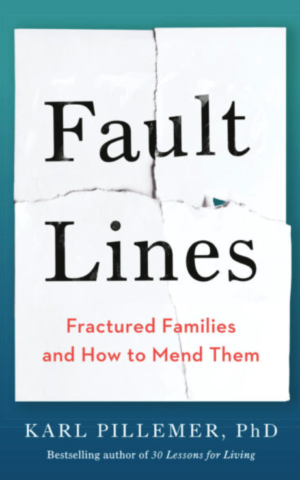Family Estrangement Can Be a Passover Problem
Feeling cut off from a loved one can feel even more painful during holidays.
When some families sit down to their Passover seders this year, there may be an empty chair or a family member missing. It may not always be empty because the person didn’t want to be there; it could also be that they weren’t invited.
At times like these, when themes of family togetherness and affection are especially pronounced, the problem of what psychotherapists call estrangement from close family members is most powerfully and deeply felt.
In some cases, parents and their adult children maintain either a frosty relationship or no relationship at all. Brothers and sisters don’t speak. Children grow up without ever meeting an aunt or uncle or even a grandmother or grandfather who has been excluded from their life. For some, the joy of a holiday like Passover comes mingled with regret.
This is something Rabbi Judith Beiner, the community rabbi based at Jewish Family and Career Services here, has become acutely aware of in recent years.
“A holiday comes along, and for those who are estranged from family members, there’s that pang of missing and wanting. They might even search for a reason to be hopeful or call up a positive memory. So the holidays are a really hard time for people who have become excluded from their family and Passover in particular, because the central ritual puts everybody around a table in a home. That can be really painful,” she said.
 About a year and a half ago, Beiner teamed up with JF&CS community clinician Brennen Joseph to help deal with many of the issues raised by family estrangement. They organized what they called their first cycle of discussions for those who felt estranged. There would be eight sessions and those who signed up would be encouraged to confront their feelings about their enforced separation. Getting people to sign up, though, as Beiner found, wasn’t easy.
About a year and a half ago, Beiner teamed up with JF&CS community clinician Brennen Joseph to help deal with many of the issues raised by family estrangement. They organized what they called their first cycle of discussions for those who felt estranged. There would be eight sessions and those who signed up would be encouraged to confront their feelings about their enforced separation. Getting people to sign up, though, as Beiner found, wasn’t easy.
“To get somebody to come to a group is hard,” she says. “You know, I think lots of people don’t want to open up. And, as Brennen found, there’s a lot of shame around it, and there’s a little extra dose of shame in the Jewish community. There’s this notion that, what kind of Jewish mother or father am I if my children are estranged from me? So there’s that additional burden. And that surprised me.”
Karl Pillemer, a professor of gerontology at Cornell University who has studied estrangement, told the Cornell Chronicle in 2020 that the reluctance to talk about family estrangement keeps it hidden.
“It’s become clear that estrangement is a very widespread problem that was hiding in plain sight,” he said. “I felt it was critically important to bring this problem out of the shadow and into the clear light of open discussion and dialogue.”
 His book, “Fault Lines: Fractured Families and How to Mend Them,” is recommended reading for the estrangement group at JF&CS.
His book, “Fault Lines: Fractured Families and How to Mend Them,” is recommended reading for the estrangement group at JF&CS.
In what is thought to be the first large-scale national survey on the issue, Pillemer found that 27 percent of Americans 18 and older had severed a family relationship and that most were not happy about it. Nationally, that statistic would mean that at least 67 million Americans have cut off at least one person in their family.
According to Joseph, the JF&CS clinician, once people are able to break through the silence and publicly acknowledge that there is a problem, they can begin to consider what comes next.
“What we tell our participants is that the goal is to find a way to move on and to move forward with whatever the current situation may be. Knowing that most individuals who are coming are seeking help and support. They’re coming to find coping skills to help them to move forward, to find a new norm and get used to this new lifestyle. They’ve done everything else or tried other things to make it work and they’ve had a hard time.”
As a starting point, she suggests staying focused on the present and future and working toward a more realistic goal of what is possible.
Beiner, however, doesn’t advise initiating a conversation around the seder table or other large family gathering with someone you have avoided for years.
“The time to repair a fractured family relationship is not at the big family gathering. Don’t bring it up at the bar mitzvah. Don’t bring it up at the wedding.
It’s really not the right place for that and I’d be pretty wary of starting a conversation about estrangement.”
For more information about the JF&CS estrangement program, contact Brennen Joseph at bjoseph@jfcs-atlanta.org.




comments